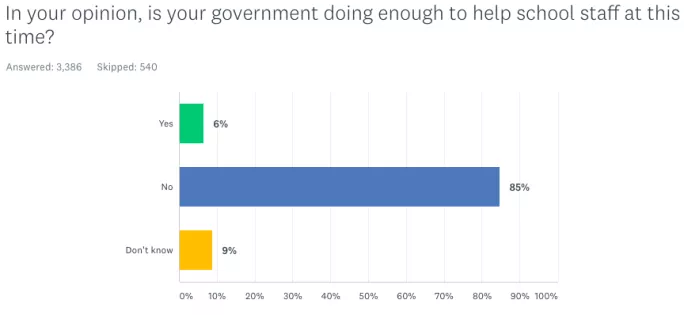- Home
- ‘They won’t listen’: Teachers’ Covid problems ignored
‘They won’t listen’: Teachers’ Covid problems ignored

School staff have used a Tes survey to condemn their treatment by the Department for Education during the coronavirus pandemic, with 85 per cent saying the government is not doing enough to help them.
Feelings that teachers and other staff in England’s schools have not been listened to and “vilified” are laid bare in nearly 3,400 responses to a snap Tes poll.
Just 6 per cent said they thought the government was doing enough to help during the Covid-19 pandemic.

“The government don’t want to listen,” one respondent said.
“Their guidelines are a shambles and they don’t understand real schools or school life. Headteachers have been left to try and sort the situation out themselves in a virtually impossible situation.”
News: Steep decline in teachers’ trust in DfE during the pandemic
Coronavirus: Teachers ‘need support for online lessons’
Quick read: ‘We can’t home-school the UK’s children’
“It would help if they didn’t actively try to vilify us. I think that it would be good to give schools clearer guidance,” another respondent commented.
Others said the government assumed teachers had more resources than they did.
“Middle-class assumptions were made: all teachers have internet access, incorrect - shared households, shared internet data limits,” a respondent commented.
“Most of us use the data off our phones to cope. Suddenly they decide that they will commandeer our personal laptops and data allowance, without any thank you. Parents then suddenly demand phone calls when they can’t cope - yet again our phone bills.”
The survey also found that just over half of school staff in England said they did not trust the DfE over its handling of schools and the pandemic “at all”, and 53.6 per cent of respondents said their trust in the DfE had dropped “significantly” since the start of the pandemic.
Others commented on the lateness of government guidance, as well as whether they would be safe to return to schools if they were clinically vulnerable.
“Many teachers do not feel safe returning to school full time with all pupils in September but do not feel able to complain,” one respondent said.
“As a clinically vulnerable person, I will still be expected to teach over 200 different children per week in September, in enclosed classrooms with 30 per class. I have been told that I have to make my own decisions to keep myself safe.”
“Guidance comes out too late to be implemented in good time. School staff work at full stretch as a matter of course; there is no time for them to do anything extra,” another said.
Not all responses were negative. One respondent pointed out: “We haven’t lost income, haven’t needed to be furloughed, and the government seems to be doing its utmost to get us back into classrooms as safely and quickly as feasibly possible.
“Decisions about working conditions are down to individual schools and this is where greater problems are.”
But others commented on the DfE’s apparent misunderstanding or ignorance of the realities of school environments, while some drew contrasts between public support for NHS workers and criticism of teachers in the last few months.
“The demonisation of school staff and unions which took place over the understandable caution shown towards the reopening of schools was abhorrent. There is too much direction from the top, from people who have little to no understanding of what a modern classroom in this country looks like,” one respondent said.
Nick Brook, deputy general secretary of the NAHT school leaders’ union, said: “Everyone working in schools wants a return to full education in September and school leaders and their teams are working together closely to achieve this.
“But anxiety is still high, for both school staff and families. We would like to see the government undertake a comprehensive programme of public information over the summer to prepare everyone for September, sharing clear information about what to do in order to build confidence that it is safe for children to return to class.”
A DfE spokesperson said: “We know that schools and teachers have gone to enormous lengths over recent months to support children at home and enable many to return to the classroom already.
“Last week, almost 1.6 million pupils were back at schools and colleges, which is testament to the efforts of everyone working in education.
“We continue to engage with school leaders, teaching unions and the wider sector ahead of September, as well as working closely with the scientific and medical experts.”
Keep reading for just £1 per month
You've reached your limit of free articles this month. Subscribe for £1 per month for three months and get:
- Unlimited access to all Tes magazine content
- Exclusive subscriber-only stories
- Award-winning email newsletters



